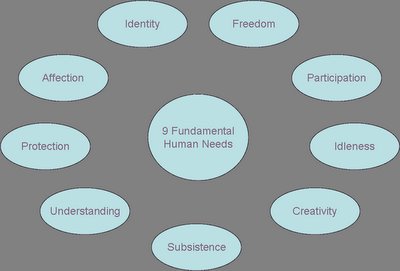
A bit more on Max-Neef. Aside from being a great guy and interesting character, he’s done some incredible work in the broad areas of development, social sustainability and economics.
Two of his major focal points during his lectures here were around the concept of Transdisciplinarity (essentially a way of avoiding reductionism, or ‘over-specialization’ and promoting whole systems thinking, much more on all of this later) and the “Needs Matrix” that he has developed.
The Needs Matrix is based on identifying the 9 fundamental human needs and separating them from the satisfiers of those needs. The needs he identifies are…
… in no particular order and with none more important than the other (it is difficult to see how Subsistence wouldn’t take some sort of priority, seeing as without it none of the others would be possible – but his argument is that if any aren’t met, you aren’t really alive anyway).
In terms of keeping needs distinct from satisfiers, it’s easiest to use some examples – food, shelter, clothing aren’t needs, they are satisfiers of the need Subsistence. He also goes further to distinguish between certain types of satisfiers:
Destroyers: paradoxical satisfiers that are supposed to satisfy one need, but end up destroying one’s ability to meet many other needs – these are almost always meant to meet the need for protection and include things like censorship, authoritarianism, and arms races – which in various ways inhibit people from meeting their needs of freedom, participation, creation, etc.
Pseudo-satisfiers: these generally create a false sense of satisfaction, and can overtime making harder to meet the need they were originally intended to satisfy. They include things like status symbols (identity), stereotypes (understanding), prostitution (affection), and fashion/fads (identity).
Inhibiting satisfiers: usually associated with habits and customs these ones can over-satisfy one need while making it difficult / impossible to meet other needs – an overprotective family is an example, in obsessing on meeting the need for protection, it can inhibit affection, understanding, participation, idleness, identity and freedom. Commercial TV probably falls under this category too, in satisfying idleness, understanding, creation and identity can be inhibited.
Singular satisfiers: these ones satisfy one need and are largely neutral to others and include things like many social programs (i.e. soup kitchens satisfy subsistence), and curative medicine (as opposed to preventative, satisfying subsistence). Max-Neef suggests sports spectacles satisfy idleness, I would argue you could also tack on participation and identity, maybe even affection, understanding and freedom (Go Pats!!).
Synergic satisfiers: satisfy one need, and as a result satisfy many other needs simultaneously. Examples include preventative medicine (protection, understanding, participation, subsistence), cultural TV (idleness, understanding), breast-feeding (subsistence, affection, protection, identity), and growing your own food (subsistence, understanding, participation, creation, identity, freedom).
Max-Neef has also developed a process for communities to go through these needs and identify in what ways their cultural traditions, institutions, etc. inhibit them from meeting their needs, so they can get some perspective and start to deal with how to improve things. This approach is a good fit with the sustainability principles, in that in a way they give a definition for success for social sustainability (building on the 4th Principle). The idea is that these are fundamental needs that don’t change between cultures or over time (except maybe the very long-term). It is just the satisfiers that vary greatly between cultures and generations.
Given the complexity and subjectivity of social systems, this isn’t easy stuff to wrap your head around – but I think it’s helpful in getting a bigger picture view, and starting to make sense of a lot of those vague, difficult to articulate ideas about societal problems. In thinking about all the strange pathologies we see in our society in the
Not to suggest that that’s an easy undertaking, by any means, but at least the ground work can be laid for a strategic approach to solving some of these problems.
Stay going…

No comments:
Post a Comment